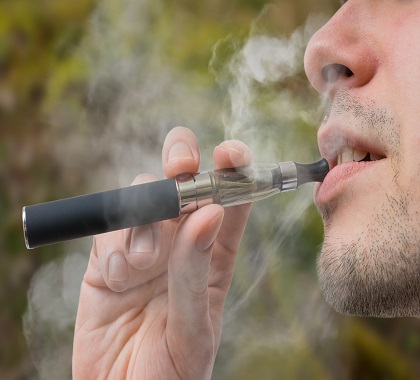E-cigarettes’ health benefits outweigh their risks according to a March 2018 study in Nicotine & Tobacco Research. Tobacco harm reduction (THR) products such as e-cigarettes have been touted as viable alternatives to combustible cigarettes particularly because of their efficacy in smoking cessation.
Despite THR product’s benefits, states are decreasing THR products availability while increasing their costs. In recent years, policy makers have instituted several draconian measures on THR products, such as: outright bans, onerous taxes, and minimum purchase ages between 18 and 21. These policies are not based on research and actually undermine the public health gains THR products provide to millions of smokers.
The March report comes on the heels of a previous study that found “a majority of adults erroneously link nicotine to cancer,” indicating most Americans incorrectly believe nicotine causes cancers and other health risks. Such false notions undermine nicotine’s presence in THR products. Ironically, despite Americans misperceptions, many smokers are choosing THR products instead of combustible cigarettes to avoid major health risks.
Electronic cigarettes and vaping devices are significantly less harmful than combustible cigarettes. In fact, the use of e-cigarettes “is around 95% safer than smoking,” Public Health England declared in 2015. And health risks associated with e-cigarette use were “unlikely to exceed 5% of the harm from smoking,” the Tobacco Advisory Group of the Royal College of Physicians found in 2015.
Furthermore, e-cigarette use resulted in “reduced short-term adverse health outcomes in several organs,” the National Academies of Sciences, Engineering and Medicine reported in January 2018. Even the American Cancer Society noted the “currently available evidence, using current generation e-cigarettes is less harmful than smoking.”
Electronic cigarettes replacing combustible cigarettes also help state budgets. In 2010, 8.7 percent of U.S. health care spending, about $170 billion per year, was attributable to tobacco cigarettes. If only 1% of smokers permanently switched to e-cigarettes, Medicaid programs could save about $2.8 billion annually, with median states’ “savings exceeding $32 million per year.”
Though THR products are effective tools for smoking cessation, state and local policy makers treat these products more and more like combustible cigarettes. Thirteen states and more than 700 municipalities classify electronic cigarettes and vaping devices as prohibited products in smoke free laws. All states have “at least some tax on non-cigarette tobacco products.” Such policies perpetuate THR demonization, even though these products are effective alternatives to smoking combustible cigarettes.
In addition to e-cigarettes, other THR products such as smokeless tobacco and heat-not-burn devices allow nicotine consumption with significantly less health risks than combustible cigarettes. Policy makers should promote, or at the very least not discourage, potentially life-saving THR products.
What We’re Working On
Energy & Environment
EPA Revokes Interim Fuel Economy Increases
In this article for Environment & Climate News, Managing Editor H. Sterling Burnett writes on U.S. Environmental Protection Agency (EPA) Administrator Scott Pruitt revoking standards requiring cars and light trucks sold in the United States to achieve an average of more than 50 miles per gallon by 2025. EPA approved the current emission standards in December 2016, just before President Barack Obama left office, a full two years they were scheduled to be reviewed. Burnett notes the standard imposed in late 2016 would substantially increase the price of cars and forces automakers to produce cars consumers don’t want.
Education
Indiana, Colorado Ranked at Top for Charter School Laws
In this School Reform News article, Ashley Bateman compares new state-by-state rankings of public charter school laws by the National Alliance for Public Charter Schools (NAPCS) against its updated model legislation. Indiana ranked number one in the nation. Indiana’s unrestricted charter school growth, multiple authorizers, and high-quality autonomy and accountability make the Hoosier State the best in the country. Colorado took second place. A separate report by NAPCS considers the implementation of those laws and factors for growth, innovation, and quality.
Health Care
Expanding Medicaid in Virginia Would Not Improve Health Care Costs or Outcomes
In this Research & Commentary, Senior Policy Analyst Matthew Glans examines a new effort to expand Medicaid in Virginia. Old Dominion legislators are proposing to dramatically increase the cost of Medicaid and impose myriad new restrictions. “Virginia should reject Medicaid expansion and choose to embrace meaningful reforms that would help increase access to high-quality, more-affordable health care without increasing state budgets or the national debt by using Section 1115 waivers,” Glans wrote.
Budget & Tax
States Move to Re-impose Unnecessary Net Neutrality Rules
Glans reports on a disturbing trend to to re-impose net neutrality rules at the state level. “Reimposing a vast array of government regulations such as net neutrality would stifle what has made the internet one of the biggest growth sectors of the economy. Doing this on a state by state basis would make some states less economically competitive and harm consumers,” Glans wrote.
From Our Free-Market Friends
ABQ Needs Fiscal Reforms, Not Tax Hikes
Albuquerque should reduce employee-related costs to shore up the city’s budget, researchers at the Rio Grande Foundation argue. The city council will soon vote on a 52 percent hike in Albuquerque’s gross receipts tax to cover skyrocketing municipal employee costs, which now eat up a whopping 49 percent of the budget. Thus, there is huge potential to save Albuquerque taxpayers’ millions of dollars by decreasing city personnel. Instead of raising taxes, a better solution is to privatize government properties (such as the Albuquerque Convention Center) and outsource public services (such as the “Albuquerque Rapid Transit” city bus system), thereby reducing the need for city personnel.
Click here to subscribe to The Leaflet, the weekly government relations e-newsletter.




